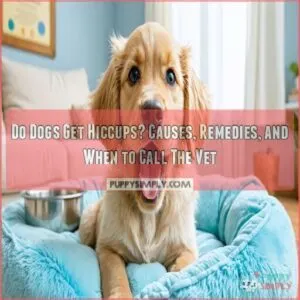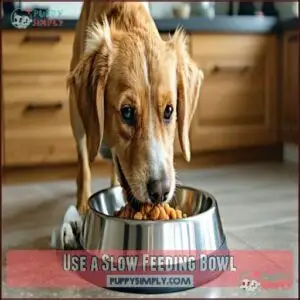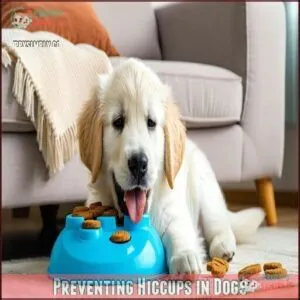This site is supported by our readers. We may earn a commission, at no cost to you, if you purchase through links.
 Yes, dogs do get hiccups, just like humans.
Yes, dogs do get hiccups, just like humans.
You’ll notice your furry friend’s diaphragm contracting with that familiar "hic" sound or body jerk. Puppies are especially prone to hiccups when they’re excited or eat too quickly—like kids who gulp down their food!
Most hiccups resolve on their own within minutes, so there’s no need to panic when your pooch starts hiccupping after a enthusiastic meal.
Simple remedies include offering water or gentle belly rubs. However, if your dog’s hiccups last more than an hour or come with unusual symptoms, they might be trying to tell you something more serious is happening, and you should consider that your dog’s hiccups could be a sign of an underlying issue, making it essential to monitor their behavior and take action if necessary, such as consulting a veterinarian, which can provide professional advice and help you identify the cause of the persistent hiccups.
Table Of Contents
- Key Takeaways
- Dog Hiccup Basics
- Do Dogs Get Hiccups
- Hiccup Causes in Dogs
- Relieving Hiccups in Dogs
- Preventing Hiccups in Dogs
- When to Worry About Hiccups
- Frequently Asked Questions (FAQs)
- Do dogs get hiccups?
- What are the common causes of hiccups in dogs?
- Can dogs get hiccups if they eat too fast?
- How do I know if my dog has hiccups?
- Should I be worried if my dog is hiccuping?
- How do you get rid of hiccups in dogs?
- What does a dog with hiccups look like?
- What can be mistaken for hiccups in dogs?
- What do you do when a dog has hiccups?
- Is my dog choking or is it hiccups?
- Conclusion
Key Takeaways
- Yes, dogs get hiccups just like humans, caused by diaphragm spasms that create a "hic" sound, with puppies experiencing them more frequently than adult dogs.
- Common causes include eating or drinking too quickly, excitement, stress, sudden temperature changes, and swallowing air during play—all of which can irritate your dog’s diaphragm.
- You can help relieve your dog’s hiccups by calming them down, offering small sips of water, gently massaging their throat, or using slow-feeding bowls to prevent rapid eating.
- While most hiccups resolve on their own within minutes, you should contact your vet if they last longer than an hour or come with concerning symptoms like difficulty breathing, vomiting, or lethargy.
Dog Hiccup Basics
Dogs can get hiccups just like humans, caused by sudden spasms in their diaphragm.
They’re usually harmless and more common in puppies, thanks to their developing bodies and playful habits.
What Are Hiccups
When dogs hiccup, it’s due to diaphragm spasms closing the glottis, creating that familiar “hic” sound.
This mammalian reflex happens in all mammals, including dogs, often as a way to remove trapped air.
Fun fact: canine hiccups may even date back to fetal hiccups, helping pups test their breathing muscles before birth.
- Key points about hiccup basics:
- Involuntary diaphragm spasms.
- Sudden glottis closure causes a “hic” sound.
- May aid air removal or muscle development.
Hiccup Sounds and Breathing
When your pup gets hiccups, you’ll notice short, sudden "hic" sounds caused by glottis closure and diaphragm spasms.
These hiccup sounds happen as their respiratory muscles contract, briefly interrupting normal breathing patterns.
Some dogs might produce faint respiratory noises, almost like sniffles, while others seem entirely at ease.
Thankfully, hiccups breathing usually doesn’t cause breathing difficulties, so there’s nothing to worry about, and this is often due to normal breathing patterns.
Hiccup Frequency and Duration
Hiccups in pets, especially pups, are typically brief and harmless.
The normal hiccup duration ranges from a few seconds to several minutes. Puppy hiccup frequency tends to be higher due to age and immature muscles.
Here’s what’s typical:
- Puppies: Frequent hiccups, lasting up to 15 minutes.
- Adults: Rare, brief spells.
- Concern: Hiccups exceeding an hour.
The provided information gives a general idea of what to expect regarding hiccups in pets.
Do Dogs Get Hiccups
Dogs absolutely get hiccups, just like humans.
In fact, puppy hiccups are even more common since little ones tend to swallow air more frequently while eating or playing.
Breed predisposition plays a role too—brachycephalic breeds like pugs might deal with hiccups more often due to airway challenges.
Theories, like the ones about fetal hiccups testing breathing muscles before birth, suggest hiccups could be a natural reflex in mammals.
So yes, hiccups in dogs are normal and usually harmless!
Eating too fast can lead to stomach gas buildup.
Hiccup Causes in Dogs
Dogs get hiccups for many of the same reasons you might—like eating too fast or feeling stressed.
Quick breathing, stomach gas, or even sudden temperature changes can all irritate their diaphragm and trigger those funny little spasms.
Eating or Drinking Too Quickly
When your pooch gulps down meals like a vacuum, they’re likely swallowing air, which triggers dog hiccups.
Avoid hiccups after eating by focusing on gulping prevention:
- Use slow-feeder bowls to control meal inhalation.
- Break food into smaller portions.
- Try hand-feeding for better pacing.
- Adjust the bowl design to reduce air swallowing.
Simple dietary changes can work wonders!
Spicy Food and Stomach Gas
Three main culprits in spicy food can trigger hiccups in your dog.
Capsaicin irritation from spicy foods can inflame your dog’s digestive system, causing excess gas and diaphragm spasms.
Some breeds show higher predisposition to this reaction.
In addition to spices, certain condiments can also be harmful, as toxic compounds exist in common household items.
| Dietary Impact | Symptoms | Gas Relief |
|---|---|---|
| Stomach inflammation | Hiccups | Gentle massage |
| Increased acid production | Discomfort | Removing spicy food |
| Puppy sensitivity | Expelling gas | Water in small amounts |
The table outlines the dietary impact and corresponding symptoms, along with suggested gas relief measures, including gentle massage and removing spicy food.
It is essential to address these issues promptly to ensure your dog’s comfort and well-being, especially considering their potential puppy sensitivity.
Stress or Excitement
Beyond food issues, your dog’s emotional state can trigger hiccups too.
Stress-induced hiccups or overexcitement hiccups happen when your pup breathes irregularly during heightened emotions.
- Anxiety triggers like thunderstorms or visitors can cause rapid breathing, leading to hyperventilation risks
- Playtime hiccups often occur after intense exercise when dogs breathe heavily
- Overexcitement during car rides or reunions can disrupt normal breathing patterns
Dog stress management includes maintaining calm routines and recognizing when excitement management is needed.
Sudden Temperature Changes
Four distinct temperature scenarios can trigger hiccups in your dog.
Rapid shifts between warm environments and cold air irritate your pup’s esophagus and vagus nerves, leading to those familiar "hic" sounds.
| Temperature Factor | Effect on Dogs | Prevention Tip |
|---|---|---|
| Sudden cold drafts | Irritates phrenic nerves | Block doorway gaps |
| Heatstroke conditions | Affects diaphragm muscle | Provide shade and water |
| Seasonal changes | Increases temperature sensitivity | Adapt gradually |
| Icy water consumption | Shocks esophagus | Serve room temperature water |
| Winter draft exposure | Chills body rapidly | Use dog sweaters outdoors |
Relieving Hiccups in Dogs
You’ll find several simple and effective ways to help your pup overcome those pesky hiccups at home.
From offering a small sip of water to gentle belly rubs, these remedies can bring quick relief to your hiccupping furry friend, using methods like gentle belly rubs.
Calm Them Down
When your dog develops hiccups, a calm environment often works wonders.
Gently massage their chest while speaking in soft tones to promote slow breathing. Cuddle time can naturally regulate their breathing pattern, while quiet surroundings reduce stress.
Simple distraction techniques like gentle walks or playing with a favorite toy shift their focus away from hiccups.
For persistent cases, these hiccups relief methods serve as effective home remedies.
Give Them Some Water
After calming your pup, offering water can help stop those pesky hiccups.
Fill a water bowl with room temperature water—not too cold or hot.
Let your dog take small sips rather than gulping to prevent more hiccups.
Monitor their hydration levels while controlling water intake.
Some pet parents find that switching to a shallower water bowl helps reduce the air swallowed during drinking, easing hiccups in dogs.
Gently Massage Your Dog’s Throat
Water isn’t the only hiccup solution.
A gentle throat massage can work wonders for your hiccuping pup. Using light pressure points along your dog’s neck and chest area, apply circular motions with your fingertips.
This massage technique helps relax the diaphragm muscles causing those pesky hiccups. Different breeds show varying sensitivity to touch, so watch your dog’s reaction.
This calming effect often provides immediate hiccup relief and doubles as a bonding moment.
Use a Slow Feeding Bowl
While throat massages help in the moment, preventing hiccups is even better.
If your dog eats too quickly, invest in a slow feeder bowl. These specially designed bowls have ridges or maze-like patterns that make your pup work for their food, slowing down their eating habits.
Bowl material matters – look for durable options that match your dog’s breed specifics. For example, stainless steel bowls resist bacterial biofilm.
Size matters too – verify it’s appropriate for your dog’s muzzle size to ensure comfortable eating.
Preventing Hiccups in Dogs
You can prevent those pesky hiccups from disrupting your dog’s day by making simple changes to their eating routine and environment.
Managing your pup’s meal pace with puzzle toys and creating a calm atmosphere will substantially reduce those diaphragm spasms that leave both of you frustrated, which can be achieved by making a few adjustments to promote a calm atmosphere.
Puzzle Toys and Hand-feeding
Now that you’ve got methods to calm your pup’s hiccups, let’s prevent them before they start.
Interactive food toys and puzzle toys provide mental stimulation while slowing down mealtime. Hand-feeding creates a bonding experience and lets you control portion size.
Slow-feeder bowls are excellent for breeds prone to gulping. These meal enrichment options serve as training aids too, teaching patience during mealtimes and reducing those pesky hiccups from happening in the first place.
Many owners find success using interactive treat dispensing toys to keep their dogs engaged and prevent hiccups, which is a key part of preventing them.
Avoiding Overly Hot or Cold Foods
Temperature extremes in your dog’s diet can trigger hiccups through esophageal sensitivity. Serve meals at room temperature to prevent diaphragm irritation.
Hot foods may cause your pup to gulp water quickly afterward, while freezing treats can shock their system.
Different breeds have varying predispositions to hiccups from temperature changes. For ideal dog health and hiccups prevention, allow food to cool or warm slightly before serving to avoid diaphragm irritation.
Reducing Stress and Excitement
During moments of high excitement, your dog’s breathing can become irregular, leading to those pesky hiccups.
Create safe spaces where your pup can retreat when overwhelmed. Establish consistent routines to minimize anxiety and practice calming techniques like gentle petting.
Different breeds have varying predispositions to stress-induced hiccups. Brief daily exercise helps release energy without overexcitement.
Remember, effective dog stress management isn’t just about preventing hiccups—it improves their overall wellbeing too, and helps with calming techniques.
When to Worry About Hiccups
While most dog hiccups are harmless and disappear within minutes, you’ll need to contact your vet if they last longer than an hour or come with symptoms like difficulty breathing, vomiting, or lethargy.
You can usually enjoy the adorable sight of your pup’s hiccups, but it’s important to recognize when this common quirk might signal something that needs medical attention.
Hiccups Lasting Over an Hour
While occasional hiccups are normal, those lasting over an hour warrant veterinary consultation.
Prolonged hiccups can signal underlying conditions requiring diagnostic tests or treatment options. Your dog’s persistent hiccupping might indicate gastrointestinal issues, respiratory problems, or even medication side-effects.
One should also notice breathing and behavior changes. Don’t wait until tomorrow – if hiccups continue beyond 60 minutes, it’s time for urgent care.
This isn’t a wait-and-see situation, as extended hiccupping can cause distress and discomfort.
Hiccups Accompanied by Other Symptoms
Your dog’s hiccups might be trying to tell you something more serious when they come with other symptoms.
Persistent hiccups accompanied by coughing, vomiting, or lethargy warrant veterinary attention.
- Respiratory issues like asthma or pneumonia often announce themselves with hiccups plus wheezing or sneezing
- Gastrointestinal problems may combine hiccups with vomiting and abdominal pain
- Parasitic infections can trigger hiccups alongside diarrhea and bloody stools
Difficulty Breathing and Choking
If you notice your dog struggling to breathe or showing signs of choking during hiccups, it’s time for immediate action.
Brachycephalic breeds have a higher predisposition to airway obstruction issues.
Watch for respiratory distress, gagging, or pawing at the mouth, which might indicate foreign objects causing breathing issues.
Never ignore these emergency situations—aspiration risks and choking hazards require quick emergency response to prevent serious complications.
Frequently Asked Questions (FAQs)
Do dogs get hiccups?
Yes, just like kings of old, dogs do get hiccups.
They’re caused by diaphragm spasms that create that familiar "hic" sound.
You’ll notice puppies get them more often than adult dogs.
What are the common causes of hiccups in dogs?
Your dog’s hiccups are commonly caused by eating or drinking too fast, excitement, stress, or vigorous play.
Swallowing air is the main culprit, especially in puppies who tend to gulp enthusiastically, which can be considered a complete concept related to the cause of hiccups.
Can dogs get hiccups if they eat too fast?
Indeed, eating too fast is a primary cause of hiccups in your dog.
When they gulp down food rapidly, they swallow excess air, triggering diaphragm spasms that result in those characteristic "hic" sounds.
How do I know if my dog has hiccups?
You’ll know your dog has hiccups if it makes rhythmic "hic" sounds with small, jerky diaphragm movements.
It’s like watching a tiny puppy dance-off—charming, harmless, and usually gone in just a few minutes!
Should I be worried if my dog is hiccuping?
Dog hiccups are usually harmless and resolve on their own within minutes.
You should only worry if they persist for hours, occur frequently, or come with other symptoms like vomiting or difficulty breathing.
How do you get rid of hiccups in dogs?
To relieve your dog’s hiccups, offer a small sip of water, try gentle belly rubs, or take them for a calm walk.
Slow feeders can prevent future episodes by controlling their eating pace.
What does a dog with hiccups look like?
Like a metronome caught in a glitch, your dog’s body will jerk rhythmically with each hiccup.
You’ll notice small spasms, a "hic" sound, and sometimes confused head tilts as they experience this harmless phenomenon.
What can be mistaken for hiccups in dogs?
You might mistake reverse sneezing, coughing, gagging, or respiratory distress for hiccups in your dog. These conditions may appear similar but often require different attention and sometimes veterinary care.
What do you do when a dog has hiccups?
When your dog has hiccups, offer a small sip of water, gently massage their chest, or take them for a calm walk.
Most hiccups resolve on their own within minutes without intervention, but trying to help them can be reassuring.
Is my dog choking or is it hiccups?
Hiccups appear as rhythmic spasms with a distinctive "hic" sound.
Choking involves distress, pawing at the mouth, and difficulty breathing.
You’ll notice your dog remains calm with hiccups but panics when choking.
Conclusion
Remarkably, over 85% of dogs experience hiccups at some point in their lives.
Now that you understand why dogs get hiccups and how to help them, you’re better equipped to handle these harmless episodes.
Remember, most hiccups resolve naturally within minutes, but persistent ones might signal underlying issues.
By monitoring duration and accompanying symptoms, you’ll know when home remedies are sufficient or when it’s time to consult your vet.
Your furry friend’s hiccups are usually nothing to worry about!
- https://www.akc.org/expert-advice/health/can-dogs-get-hiccups/
- https://www.thekennelclub.org.uk/health-and-dog-care/health/health-and-care/a-z-of-health-and-care-issues/why-does-my-puppy-have-hiccups/
- https://www.goodrx.com/pet-health/dog/hiccups
- https://thevets.com/blog/dog-hiccups/
- https://vhavets.com/blog/why-does-my-dog-have-hiccups/

















